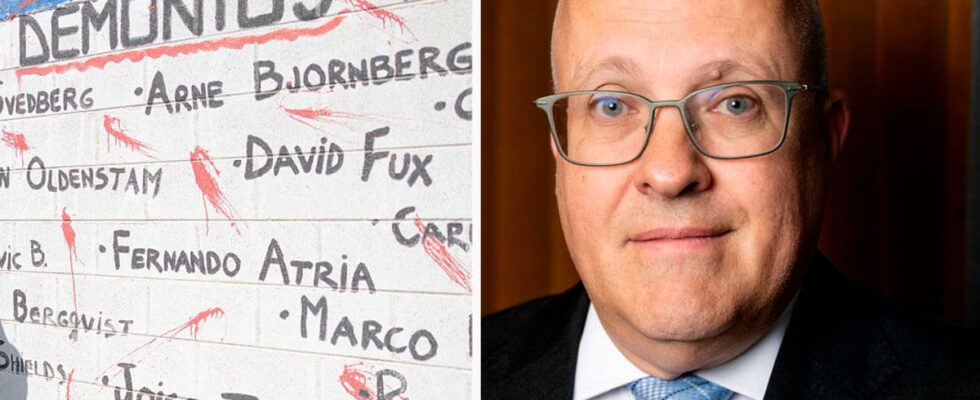unsaveSave
ⓘ The summary is made with the support of AI tools from OpenAI and quality assured by Aftonbladet. Read our AI policy here.
Show more
chevron-down
expand-left
full screen Mikael Staffas, CEO of the mining company Boliden. Photo: Christine Olsson/TT
Boliden’s CEO Mikael Staffas denies that major owner Folksam has demanded that the company act after the poison disaster in Arica.
– I think they have gotten into trouble because they got Aftonbladet after them. It is nothing more than that, says the mining director to Ekonomikanalen EFN.
But Folksam insists that they both emailed and called – and that Boliden confirmed receipt.
In several investigative reports, Aftonbladet has described the situation in the Chilean city of Arica.
Forty years after the Swedish mining company Boliden shipped 20,000 tons of toxic wet plant sludge there, children continue to fall ill. A total of 12,000 have been affected, and many have died as a result of the mine waste, according to the UN. The situation also threatens to worsen as the toxins spread into the soil and groundwater.
The review has caused some of Boliden’s largest owners to react and demand that Boliden act to solve the problems.
– The question of Arica has haunted Boliden for a long time and for the future we would like to see the company evaluate what options are available for them to be involved and contribute to improving the situation, said Emelie Westholm, head of responsible ownership at tenth largest owner Folksam.
“In a pinch”
But in one long interview with Ekonomikanalen EFN this week, Boliden’s CEO Mikael Staffas downplays the information. He claims that Folksam’s owner manager did not make any criticism at all.
– I have read it and it is written in the newspapers that she would contact us for a meeting and make that criticism, but she has not done that. I think they have gotten into trouble because they got Aftonbladet after them. It is nothing more than that, he told EFN.
expand-left
full screen “Murderer” is written on the wall where many Swedish names are included. Photo: Magnus Wennman
The statement has caused Folksam to react strongly. Press manager Kajsa Moström writes in an email to Aftonbladet that Boliden – contrary to the mining director’s claim – has been contacted both by email and phone.
– The email was answered so we know it arrived. We also wrote that we would be happy to discuss the issue of Arica further with the company, but have since received no response regarding this.
Going against the CEO
In the sequel The EFN interview claims Mikael Staffas that the Chilean company Promel bought the material from Boliden in the 1980s. In fact paid the Swedish mining company Promel ten million kroner.
He also claims that Boliden would have been acquitted “morally” by the UN, despite the fact that the UN’s special poisons rapporteur time and again demanded that Boliden takes responsibility for human rights and returns the waste to Rönnskärsverken, where it came from.
Aftonbladet has contacted Boliden to ask if Mikael Staffas stands by his statement that Folksam did not make contact. We have also asked for an explanation for the claims that the waste would have been sold and that the UN would have exonerated the mining company morally.
expand-left
full screen “The Swedish cemetery” in the desert outside Arica. Photo: Magnus Wennman
Lid on
However, the company does not want to give any new answers, according to communications director Klas Nilsson:
“Boliden refers to the detailed and well-substantiated answers given to all questions relating to claims regarding the export business that was carried out in the mid-1980s.”
Kajsa Moström says that on Wednesday Folksam had further contact about Arica with Boliden:
– We hope to be able to put the incorrect statements behind us and focus further forward on the issue that is really important.
